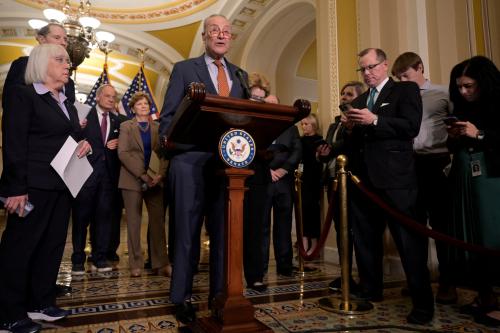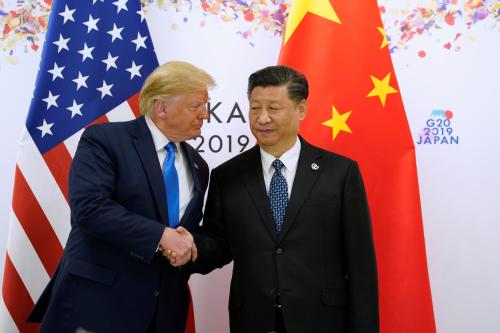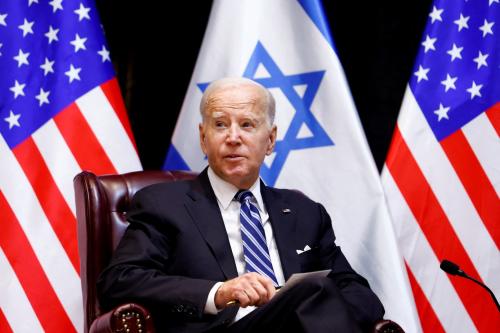The United States and China are fiercely competing across domains—including in global public opinion. The 2024 presidential election will have a crucial impact on perceptions of U.S. leadership around the world, and the next administration would be well served to consider how global audiences viewed the United States and China during the Trump and Biden administrations.
Under the Trump administration, international approval of U.S. leadership fell to a historic low, with confidence in President Donald Trump roughly on par with confidence in Chinese President Xi Jinping. Trump’s exit from multilateral institutions like the World Health Organization and treaties like the Paris Agreement, restrictive policies on immigration, and aggressive use of tariffs alienated U.S. allies and non-allies alike. Global views of the United States and China worsened during the COVID-19 pandemic by 20 percentage points and 16 percentage points, respectively.
The return of U.S. global engagement under President Joe Biden and his administration’s emphasis on strengthening ties with allies and partners boosted confidence in U.S. leadership. But with the outbreak of the wars in Ukraine and in Israel and Gaza and concerns about U.S.-China competition, global views of U.S. leadership have dimmed, with confidence in the Biden administration sliding from 58% in 2022 to 43% in 2024. China has narrowed the gap in favorability in the Global South and particularly in Southeast Asia. These developments are concerning as the United States’ soft power—that is, its ability to inspire cooperation among partners who admire U.S. values, culture, and vision—has been indispensable for maintaining America’s leading position in the international arena. As such, there is a pressing need for the incoming administration to reaffirm American global leadership and to strengthen the United States’ reputation as a force for peace and stability.
Evolving views of U.S. and Chinese leadership
The Trump administration (2017–2020)
Global views of the United States fell to a low point after Donald Trump took office in 2017. Just a few months into the Trump administration, less than half of the respondents surveyed across 37 countries by the Pew Research Center had a positive view of the United States compared to 64% at the end of the Obama presidency. The 2017 BBC World Services Poll shows the same trend—compared to 2014, the United States saw the most substantial decline in ratings out of all the countries polled, with double-digit increases in negative views among several of its NATO allies, including the United Kingdom, Spain, France, and Turkey. A growing share of people around the world also began to see U.S. power and influence as a “major threat” to their country in 2017 and 2018. Across 34 countries in Asia, Europe, Africa, and Latin America, only 22% of respondents surveyed by Pew in 2017 had confidence in Trump to do the right thing regarding global affairs, in comparison to 28% that had confidence in Xi. Trump’s signature policy proposals, including withdrawing the United States from international climate agreements and trade agreements, plans to build a wall along the U.S.-Mexican border, and the “Muslim ban” were all overwhelmingly disfavored by those who were surveyed. More than 60% of respondents spanning 37 nations surveyed by Pew in 2017 described Trump as “arrogant,” “intolerant” and even “dangerous.”
In 2017, Germany replaced the United States as the top-rated global power according to Gallup’s 2018 Rating World Leaders report. The median global approval rating of the job performance of U.S. leadership fell from 48% in 2016 to a historic low of 30% in 2017, slightly below that of China. In the Pew’s 2019 Global Attitudes Survey, Trump again received more negative ratings than Xi. Among traditional U.S. allies such as Germany, France, Spain, and the Netherlands, approximately three-quarters or more of respondents to the survey lacked confidence in Trump. Trump’s rating was especially poor in Mexico, where 89% did not have confidence in his ability to do the right thing in international affairs. But Trump enjoyed greater favorability among international audiences on the political right, with right-wing populist party supporters more likely to endorse his key policies. For instance, 67% of French respondents who had a positive view of National Rally supported Trump’s immigration policy, but just 22% of those who disliked National Rally held the same stance. However, out of all of Trump’s major policies listed in the 2019 survey, the increase of tariffs and fees on imported goods received the most backlash from respondents generally.
Positive ratings of China also declined during this period with the intensification of tensions between Washington and Beijing and the outbreak of the COVID-19 pandemic in 2020, albeit by a smaller amount. The share of people who evaluate China positively dropped by double-digits in nearly half of the Western European countries surveyed by Pew in 2019 (Sweden, the United Kingdom, and the Netherlands), though opinions of China in Global South countries remained mostly favorable. In Japan, 85% of respondents said they had an unfavorable opinion of China—the most negative among all countries surveyed, while Russians held the most positive views. By 2020, most people had unfavorable views of both China and the United States. Confidence in Trump and Xi fell to their lowest points at 17% and 19%, respectively.
Despite China’s stringent zero-COVID policies, countries around the world were more dissatisfied with the U.S. response to the pandemic in Pew’s 2020 Global Attitudes Survey. The United States’ reputation declined further during the outbreak of the pandemic among key allies and partners—only 31% in France saw the United States positively in 2020, and only 26% of Germans rated the United States favorably. Just 15% of respondents across 13 countries surveyed in that year said the United States has done a good job of dealing with the outbreak in its first year, compared to 37% for China. Consistent with support for Trump, those on the political right were more likely to approve the U.S. response to COVID-19.
The Biden administration (2021–2024)
Following the United States’ leadership transition in 2021, surveys suggest that international confidence in the U.S. president recovered immediately. While it must be noted that the Pew survey in 2021 only included high-income nations from the Organization of Economic Cooperation and Development (OECD), nevertheless there was a difference of at least 40 percentage points in confidence between Trump and Biden in all 12 nations where data was available between 2020 and 2021. A median of 77% of respondents in 12 countries described Biden as well-qualified to be president, compared with 16% who felt this way about Trump. Within the 16 OECD countries Pew surveyed, support for the Biden administration’s proposal to organize a summit of democracies was high at a median of 85%, though majorities in New Zealand, Australia, Canada, Sweden, the U.K., and the Netherlands remained skeptical of how well the U.S. political system functions. In addition, large majorities supported some of Biden’s major international policy decisions, including his plan to allow more refugees into the country (76%) and his decisions to rejoin the World Health Organization (89%) and the Paris climate agreement (85%). Favorable opinion of the United States also nearly doubled from 34% in 2020 to 62% in 2021 when Washington under Biden returned to the world stage as a multilateral player. Improvements of 25 percentage points or more were found in France, Germany, Japan, Italy, the Netherlands, and Canada.
Similar to trends in the Global Attitudes Surveys, the median global approval of U.S. leadership in Gallup’s Rating World Leaders report rebounded to 45% in 2021 and stabilized at 41% in 2022 and 2023, though Germany has maintained its lead at the top with a 5-percentage point differential to the United States in the past three years. Median approval of U.S. leadership remained steady in Europe, but the United States lost its edge as the highest-rated leader in Africa to China in 2023. Although ratings of Chinese leadership exceeded the United States in 2017 and 2018, its ratings remained lower than the United States during the Biden presidency.
Meanwhile, confidence in Xi remained at or near historic lows in most countries surveyed in the Biden years. In 16 of the 17 nations surveyed by Pew in 2021, majorities had “little or no confidence” in Xi’s ability to conduct international affairs, including half or more in Australia, France, Sweden, and Canada. In 15 of the surveyed countries with advanced economies, more than 80% believed that the Chinese government does not respect its people’s personal freedoms. However, not all states believed human rights should impact their bilateral relations with China. For instance, while a majority in New Zealand, Australia, and Japan thought it was more important to promote human rights in China even if doing so would hurt their economic ties with China, most people in South Korea and Singapore prioritized strengthening economic relations with China. Even as respondents from most states did not view China’s human rights situation favorably, respondents continued to rate China’s response to COVID-19 more favorably in 2021 than that of the United States, though the gap had gotten smaller than the previous year. This question was not included in the 2022 survey, but the results would have likely looked different with China’s draconian lockdowns that year.
From 2021 to 2022, the share of respondents who had confidence in Biden to do the right thing in international affairs decreased by double digits in 13 of the 14 countries surveyed. A 56% majority of those surveyed in spring 2022 believed the U.S. withdrawal from Afghanistan was handled poorly, even if 52% believed it was the right decision. In Italy, Greece, Spain, and Singapore, half or more had little or no confidence in Biden’s ability to conduct world affairs. Nevertheless, international audiences across 23 countries were still nearly three times more likely to have confidence in Biden than in Xi, although respondents in middle-income countries tended to rate the two leaders similarly. This difference was much larger in high-income countries, particularly in European countries like Poland and Sweden. In addition, in 2022, majorities in most countries surveyed still felt favorably toward the United States, while fewer than one-third had a positive view of China. The widest gap was observed in South Korea (70 percentage points), followed by Japan (58 points) and Australia (40 points). Notably, Beijing performed well in Southeast Asia, with Malaysia and Singapore (both 16 points) holding more favorable views of China than the United States.
Overall confidence in Biden held relatively steady in 2023, with slight dips among certain U.S. allies like the U.K., Canada, and South Korea, and a boost in other allies like Japan, Australia, and Israel. Most international respondents still believed the United States contributes to global peace and stability, even if a large majority also believed that the United States “interferes in the affairs of other countries.” Almost half of respondents thought that the United States cares for the interests of other countries in its foreign policy—in roughly half of the nations surveyed, this figure was higher than it had ever been in two decades. By contrast, a majority believed China did not contribute to global peace and stability nor does it respect the interests of other countries.
The latest Pew polls from the spring of 2024 paint a grimmer picture for the United States. Confidence in the U.S. president declined significantly, with double-digit drops in multiple countries, including Australia, the United Kingdom, Japan, and Israel, and high single-digit drops in Italy, South Korea, Mexico, and Canada. Opinions were largely split on how Biden is handling international challenges from climate change to major regional crises. Biden received the most negative marks on his policies toward the Israel-Hamas war, with a median of 57% of respondents from 34 states across the globe expressing disapproval. Nevertheless, Biden polled higher than Trump in a majority of the 34 countries surveyed, with a median of 43% of those surveyed expressing confidence in Biden and 28% indicating confidence in Trump. (This survey was conducted before the Biden-Trump debate in June 2024, and it is unclear whether and to what extent the debate may have shifted these numbers.) Confidence in Xi remained low in 2024, although it increased slightly from 19% in 2023 to 24% in 2024. Views of China, on the other hand, improved from 28% in 2023 to 35% in 2024, likely due to the inclusion of more middle-income countries in the most recent survey.
China’s growing economic power
In Pew’s 2017 Global Attitudes Survey, 42% of respondents across 38 surveyed countries saw the United States as the world’s leading economy, while 32% named China. By 2020, the final year of the Trump presidency, however, 48% of respondents identified China as the world’s leading economic power, compared to 35% of respondents who designated the United States as such. In every European country surveyed that year, a plurality or majority viewed China as the top economy in the world. This likely reflects the fact that China was the only major world economy to grow in 2020 as the U.S. economy shrunk in the first half of that year for the first time since the 2008 global financial crisis. This trend reversed once again under the Biden administration in 2021, with around half or more in every country surveyed except Singapore and New Zealand feeling it is more important for their nation to have strong economic ties with the United States than with China. In the 2023 survey, the share of respondents naming China as the top economy fell by double digits in Germany, the Netherlands, Poland, and Sweden. Globally, the decline of China’s economic influence was most pronounced in Southeast Asia, where the share of respondents that regarded China as the most influential economic power dropped by nearly 17 percentage points over the course of 2022, even as China continued to rank higher on this question than the United States in the region.
This reversal is in line with the shift in relative weights of the U.S. and Chinese economies. With the $1.9-trillion stimulus package under the Biden administration’s American Rescue Plan, the U.S. economy sustained a full recovery from GDP losses caused by the pandemic, but China’s economic recovery faced several obstacles after it reopened its economy in December 2022. China’s industrial output, retail sales, and property investment grew slower than expected for the first part of 2023, while the youth unemployment rate reached record levels. Consumer confidence and spending power remained weaker than the levels needed for China’s transition to consumption-led growth. In 2023, the GDP gap between the United States and China widened from around $5 trillion in 2021 to nearly $10 trillion.
Despite widening gaps in GDP and favorability between the United States and China, 66% of respondents across 19 countries Pew surveyed in 2022 believed that China’s influence on the world stage is getting stronger, while just 32% believed the same about the United States. This gap in perceptions is largest in Australia, where more than three times as many respondents said China’s influence is growing than those that said the same about American influence. Poland is the only country where most people still saw the United States as growing more influential than China. However, less than half of respondents in the 19 countries surveyed believed that American influence is weakening.
Shifting views in the Global South
Shifts in views of the United States and China were the most prominent in the Global South, where regional states’ enhanced trade and investment relations with China have positively impacted Beijing’s image. The Trump administration’s retreat from multilateralism and the conflicts in Ukraine and Israel-Gaza that broke out during the Biden administration have hurt the United States’ reputation. Negative opinions of the United States rose sharply in Latin American nations in 2017, especially in Mexico and Peru, likely the result of Trump’s harsh rhetoric and policies on immigration. Data from 30 global surveys compiled by the Centre for the Future of Democracy in 2022 shows that countries in continental Eurasia and the north and west of Africa moved closer to China following Russia’s invasion of Ukraine, while Western democracies aligned more closely with the United States.
Three-quarters of the 1.2 billion people who live in liberal democracies now hold a negative view of China, but 70% of the 6.3 billion who live in the rest of the world feel positively toward China. This disparity is likely explained by the fact that liberal democracies are skeptical of China’s political system and human rights issues and are more likely to see China as an economic competitor. In contrast, developing countries favor Beijing’s focus on economic development and the economic opportunities it brings through programs like the Belt and Road Initiative (BRI). For instance, 1% more people in developing countries are favorable toward China than the United States, particularly in countries that have signed on to the BRI. Among the 4.6 billion people residing in countries that have received BRI investment, almost two-thirds hold a positive view of China, compared to about a quarter in non-participating countries. Support for U.S. policies was mostly concentrated in countries in the Western Hemisphere, whereas countries like Iraq (61%), Laos (72%), and Afghanistan (84%) had particularly negative opinions of the United States.
According to a 2022 survey conducted by the Central European Institute of Asian Studies, the United States was still viewed more positively than China in 15 countries across Africa, Latin America, and the Caribbean, though majorities also saw China positively in most countries surveyed. In a report by MERICS, contributors from eight Global South countries said that their countries’ ties with China have strengthened over the last decade and noted a general tendency to lean toward the United States as a security partner and China as an economic partner. Nonetheless, all countries opposed taking sides in the U.S.-China rivalry and sought to leverage U.S.-China competition for their own benefit. In the 2023 Pew Global Attitudes Survey, views toward China were similarly more positive in middle-income countries than in high-income countries, most prominently in Kenya, Mexico, and Nigeria. These middle-income countries were hesitant to criticize China’s foreign policies and more receptive to its soft power influence. For instance, publics in middle-income countries offered relatively more favorable ratings for China’s entertainment products, universities, and standard of living. The 2024 Pew survey demonstrates a clear division in how people living in countries of different income statuses feel about China. A median of 24% of respondents from 18 high-income countries had a positive view of China, compared to a much higher 56% from 17 middle-income countries that felt the same. Those from middle-income countries are also on average 18 percentage points more likely to see China’s economic influence as positive.
A survey conducted by the ASEAN Studies Centre at ISEAS-Yusof Ishak Institute in January and February 2024 reveals that China has edged past the United States as Southeast Asia’s preferred power to align with in the U.S.-China rivalry. This shift is particularly evident in Malaysia, Indonesia, and Brunei—three countries which expressed the lowest support for Israel and highest support for the right to self-determination of the Palestinian people in the Israel-Hamas conflict. Interestingly, in the 2024 survey, countries in the Association of Southeast Asian Nations (ASEAN) cited the Israel-Hamas war as the top geopolitical event of concern for their governments, surpassing China’s aggressive behavior in the South China Sea. This is the first time since the survey was launched six years ago that China has replaced the United States as the more favored option on average in this question. This is also despite the fact that ASEAN countries have seen China as the most influential economic and political-strategic power in the region since the questions were first included in the survey in 2020. These observations suggest that it is not necessarily China’s increasing geostrategic influence but disapproval of the United States’ foreign policies that may have tipped the balance in favor of China in the U.S.-China competition in Southeast Asia. Nevertheless, support for the United States remained high in the Philippines, Singapore, and Vietnam.
Implications
Global perceptions of the United States and its reputation as a foreign policy leader have faced increasing challenges in the past decade. The Trump administration’s isolationist policies resulted in record-low levels of confidence in U.S. leadership. Global views of the United States and China both worsened during the COVID-19 pandemic as competition between the two sides intensified. The Biden administration’s international engagement boosted global confidence in the U.S. president and the United States, particularly among U.S. allies and partners in Europe and the Asia-Pacific. Yet, ongoing wars in Europe and the Middle East have undoubtedly taken a toll on views of both Biden and the United States. Mounting concerns about Biden’s health and ability to win and serve another presidential term since his recent CNN debate with Trump are unlikely to help.
In contrast, favorability toward China and Xi has remained at dismal levels among most advanced economies throughout both the Trump and Biden administrations. But China has closed the gap with the United States in the Global South where countries are generally more open to building ties with Beijing.
While the world technically does not get a vote in the upcoming presidential elections, global perceptions of the American president and of the United States’ leadership and influence have real consequences for U.S. interests. Greater confidence in the American president and the United States’ ability to lead often translates to more willingness on the part of U.S. allies and non-allies alike to work with Washington on pressing challenges that impact American and global interests. With no easy resolutions to many of the ongoing global crises in sight and a long list of challenges to tackle, the next occupant of the White House must find ways to restore global confidence in America’s vision of the world and plans for realizing it.







Commentary
Comparing global views of the United States and China during the Trump and Biden administrations
July 23, 2024